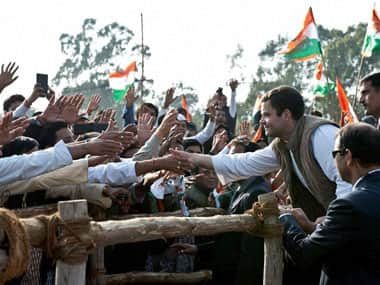“The BJP practices the politics of blood. They don’t see anything but power. Power at any cost… They won’t hesitate to spill blood if they find it necessary to usurp power,” said Rahul Gandhi at Dehradun on Sunday. Aggressive words, but vague and inconsequential in typical Rahul fashion. It neither takes the communalism debate forward nor does it singe the BJP in the way he would like. Similar words have been uttered so many times earlier by so many other leaders that it makes little sense to repeat these. [caption id=“attachment_1405405” align=“alignleft” width=“380”]  Rahul Gandhi interacting with crowds in Dehradun: PTI[/caption] If the Congress vice-president is serious about making communalism a talking point in the run-up to the elections and take the fight into the BJP camp, he must come with something more concrete against the BJP – for example, the party’s deep connection with the Sangh Parivar and the mutually beneficial arrangement between the two where one plays the Hindu card openly while the other supports or stays calculatedly aloof from it depending on political convenience. If Rahul is keen on nailing the BJP on its communal predilection – Hindu majoritarianism to be more direct - he can start with some no-nonsense questions. These would leave Modi, the BJP’s prime ministerial choice, most vulnerable. Is he what he claims he is or is he only a front office manager doing the job for the back office manipulators? If his handlers in the back office have a communal agenda to push, can Modi stop it? This question is particularly problematic since the BJP’s prime ministerial candidate has been handpicked by the mother organization, the RSS. The fundamental flaw in the approach to Hindu communalism from the political class has been to treat the BJP as separate from the RSS and its extremist fringe. It defies explanation since the connection is so clear. It could be deliberate. Whatever it is, if Rahul wants to hit the BJP hard he has to be more combative. Bland remarks like ‘politics of blood’ do not work anymore, particularly when the media and some influential sections are busy giving a ‘clean chit’ to both Modi and his party. He has to come up with stronger arguments against communalism and he must be more direct in his attack. If he cannot do that, there is no point him raising the issue. Secularism is a valid talking point in India – it has been so for the last more than 60 years and it won’t stop being so. While the ordinary masses, with their great ability to separate the religious from the political and the communal from the religious, have proved to be a strong bulwark against the progress of any communal agenda in the country, the impressionable urban, educated class appears particularly vulnerable now. Obviously, the secular political parties have not done enough to convince them. Modi and the BJP have a lot of answering to do when it comes to Hindtutva, but nobody seems keen on asking the right questions. If he wants to be a serious challenger to the ascendance of political Hindutva, Rahul must be ready to ask the difficult questions to the BJP. He cannot afford to play safe.
If Rahul is keen on nailing the BJP on its communal predilection – Hindu majoritarianism to be more direct - he can start with some no-nonsense questions.
Advertisement
End of Article


)
)
)
)
)
)
)
)
)



